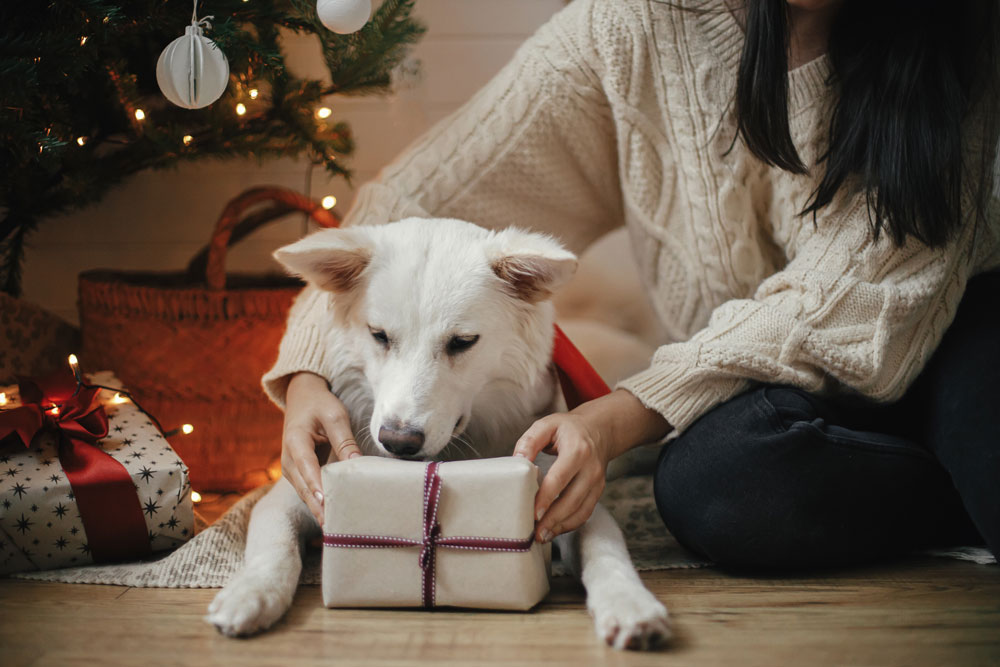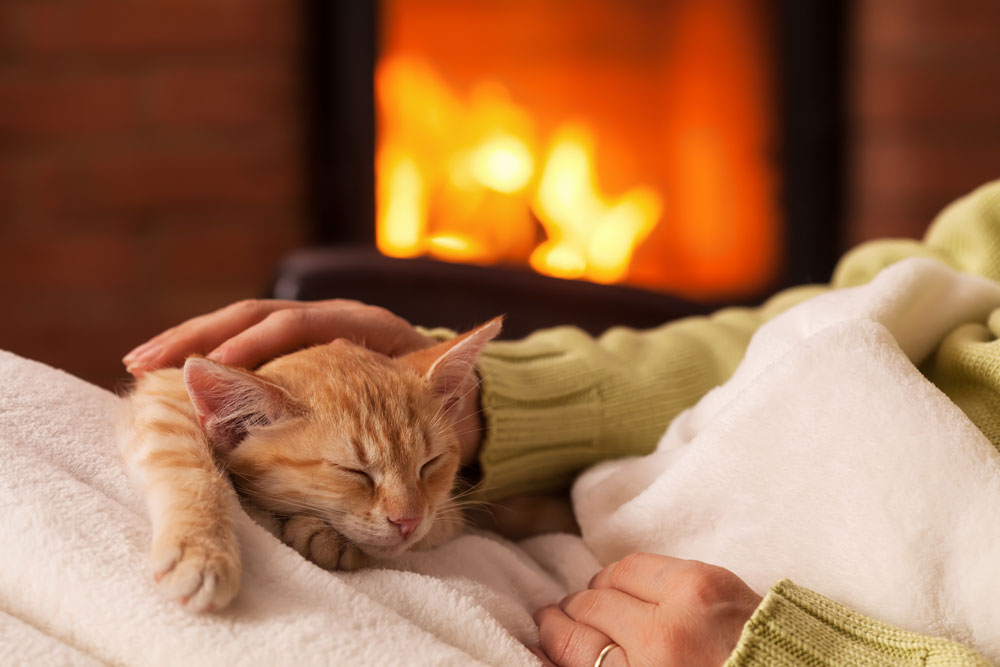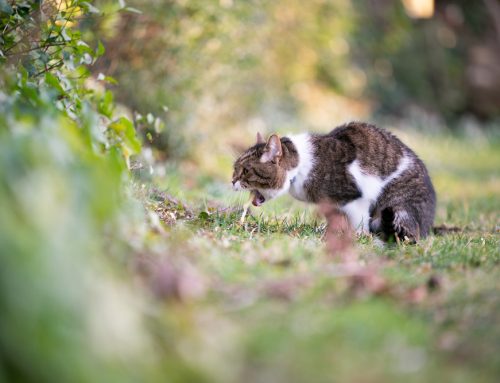As the festive season approaches, it’s essential for pet owners to be aware of the potential hazards that can arise during this joyous time. At Tamberly Animal Hospital, we are committed to helping you ensure that your beloved pets remain safe and healthy, allowing them to share in the holiday cheer without risk.
Common Holiday Hazards for Pets
Medical Implications and Immediate Actions
The holiday season is a time of celebration, but it also brings various risks to pets. Decorations like tinsel and small ornaments can cause gastrointestinal blockages if ingested, leading to symptoms such as vomiting, diarrhea, and lethargy. If your pet exhibits these signs, seek veterinary care immediately. Electrical cords pose a danger of electrocution, potentially causing burns, respiratory distress, or even cardiac arrest. Chewing on cords should be prevented by covering them or using cord protectors.
Chocolate and sweets containing xylitol are toxic to pets, often leading to symptoms such as seizures, liver failure, and hypoglycemia. Quick intervention is crucial. If you suspect ingestion, contact your veterinarian or an emergency animal hospital without delay.
Long-term Health Consequences
Ingesting toxic substances can have long-term health consequences for pets. For example, repeated exposure to chocolate can result in pancreatitis, a painful and potentially chronic condition. Continuous ingestion of small foreign objects like tinsel may cause recurring gastrointestinal obstructions, requiring surgical intervention.
Preventing Holiday Accidents
You can create a secure, enjoyable environment for your pet without sacrificing the seasonal cheer. These simple steps will help you focus on the joy of the holidays, knowing your pet is happy and safe.
1. Food Safety: Preventing Toxic Encounters
- Keep Dangerous Foods Away: Many festive foods are harmful to pets. Chocolate, alcohol, grapes, raisins, xylitol (found in sugar-free products), onions, and garlic are toxic. Store these out of reach in secure containers.
- Educate Guests: Politely inform visitors not to share table scraps with your pet, no matter how persuasive those big, soulful eyes may be.
- Dispose of Leftovers Securely: Make sure trash bins are secure and inaccessible to curious pets. Dispose of bones, fatty scraps, and food wrappings responsibly.
2. Decoration Safety: Tinsel to Tree Precautions
- Pet-Proof Your Tree: Anchor your Christmas tree securely to prevent toppling. Avoid using fragile glass ornaments, edible decorations, or tinsel, which can cause severe intestinal blockages if ingested.
- Shield Lights and Cords: Hide or cover electrical cords to prevent pets from chewing and risking electric shock. Use cord protectors or deterrent sprays as needed.
- Skip Dangerous Additives: If using a real tree, avoid using water additives like preservatives or aspirin in the tree stand, which can be toxic if pets drink the water.
- Use Flameless Candles: Real candles pose fire and burn hazards if knocked over. Opt for battery-operated flameless candles in pet-accessible areas.
3. Behavioral Wellness: Minimizing Stress
- Provide a Safe Space: Set up a quiet, secure retreat for your pet equipped with their favorite bed, toys, and access to fresh water. This space can help them relax when the festivities become overwhelming.
- Maintain a Routine: Stick to your pet’s regular schedule for feeding, walks, and playtime to provide a sense of stability amid the holiday excitement.
- Enrich with Toys: Offer enrichment activities such as puzzle feeders or chew toys to keep pets entertained and less inclined to investigate decorations or gifts.
4. Visitor Awareness: Navigating Busy Doorways
- Pet-Safe Greetings: Ensure your pet is secure when visitors arrive and leave, as an open door can be an invitation for a quick escape.
- ID Tags and Microchips: Double-check that your pet’s identification tags and microchip information are up to date in case they wander off during the commotion.
- Practice Management: For pets that are nervous around strangers, consider crating them or using a leash to manage interactions.
5. Gift-Giving Smarts: Safe Surprises for Pets
- Inspect Pet Toys: Choose toys that are safe for your pet’s size and chewing habits. Avoid toys with small parts that could pose choking hazards.
- Wrap Wisely: Keep gift wrap, ribbons, and bows away from pets to prevent ingestion and blockages.
- Supervise New Items: If gifting your pet something new, supervise them while they enjoy it to ensure there are no unexpected safety risks.

6. General Home Safety: Proactive Measures for All Areas
- Secure Hazardous Items: Keep chemicals, medications, and household cleaners out of reach. Ensure poinsettias, holly, mistletoe, and lilies—common holiday plants that are toxic to pets—are inaccessible.
- Supervise Outdoor Activities: If your festivities involve outdoor time, ensure fences and gates are secure. Remove any hazardous items from your yard, such as ice-melting chemicals or fire pits.
- Prepare for Emergencies: Keep emergency numbers handy, including your veterinarian and the ASPCA Animal Poison Control Center at (888) 426-4435.
Recognizing Symptoms of Distress or Illness in Pets
Diagnosis and Treatment
Recognizing distress early can prevent emergencies. Symptoms such as vomiting, diarrhea, excessive drooling, or a sudden change in behavior may indicate toxin ingestion. Behavioral signs of distress include panting, shaking, and excessive barking. If these symptoms arise, it’s vital to consult your veterinarian immediately.
Diagnosis may involve blood tests, X-rays, or ultrasounds to identify the problem. Treatment varies from induced vomiting in cases of recent ingestion to surgery for obstructions, or medication to counteract toxins.
Outcome and Long-term Monitoring
With prompt treatment, many pets recover fully from holiday-related emergencies. However, ongoing monitoring may be necessary, especially if the pet has a history of similar incidents. Regular check-ups ensure any long-term effects are managed effectively.
The Role of Regular Veterinary Care in Prevention
Proactive Health Management
Regular veterinary check-ups are crucial, particularly before the holiday season. These visits can help identify health issues that might predispose your pet to accidents or illnesses. Vaccinations, parasite prevention, and wellness exams are integral to maintaining your pet’s health.
How Tamberly Animal Hospital Can Help
Holiday Support
At Tamberly Animal Hospital, we offer a range of services tailored to holiday needs. Our emergency services are available to handle urgent situations, ensuring your pet receives timely care. We also provide dietary consultations to help you choose safe foods for your pet, avoiding common holiday toxins.
Should you have any concerns about your pet’s health, feel free to reach out to us at Tamberly Animal Hospital. We are here to support you and your pet throughout the holiday season and beyond.







Leave A Comment